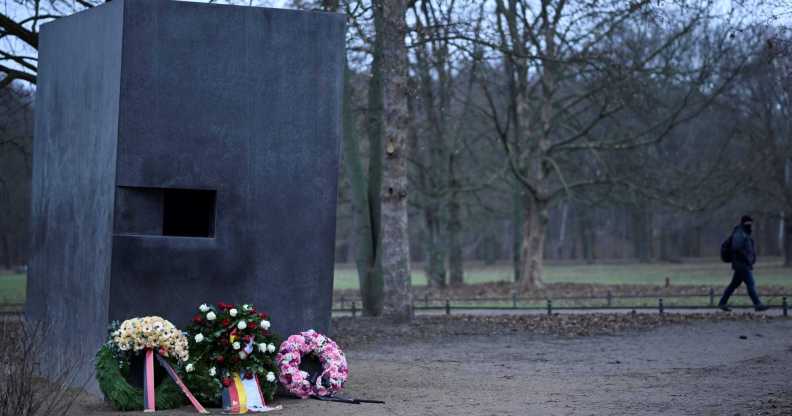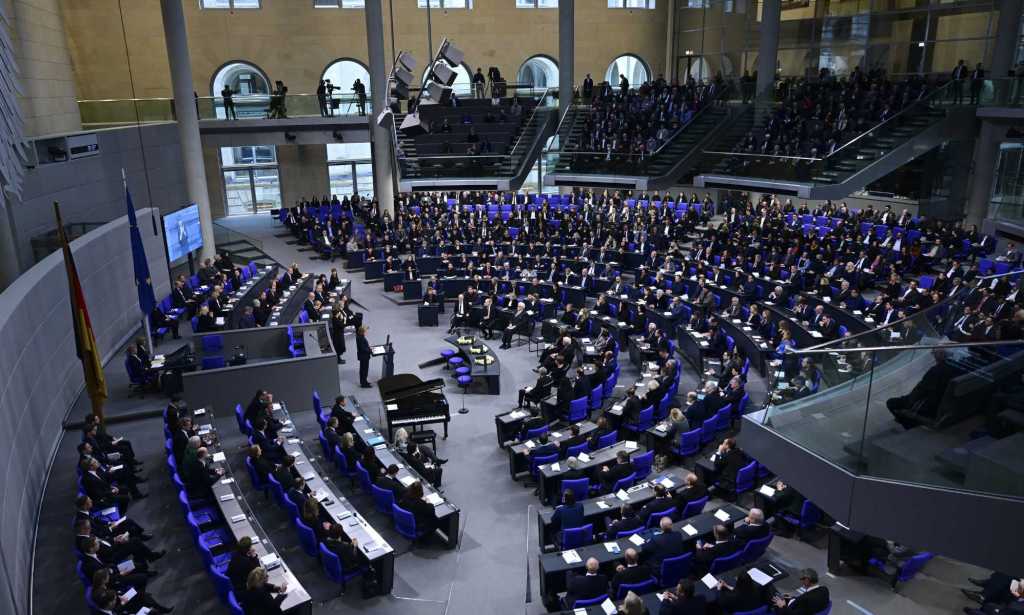German parliament honours LGBTQ+ Holocaust victims in historic commemoration

Wreaths laid in front of the Memorial to Homosexuals Persecuted Under Nazism in Berlin (TOBIAS SCHWARZ/AFP via Getty Images)
The German parliament has, for the first time, focused its Holocaust Memorial Day commemorations on people persecuted and killed for being LGBTQ+.
Holocaust Memorial Day is observed on Friday (27 January) in honour of the six million Jews and millions of others killed by the Nazis between 1933 and 1945.
Germany has officially marked the day since 1996 and each year holds a ceremony at the Bundestag, the German federal parliament.
The decision to spotlight the LGBTQ+ victims comes after decades of campaigning for the queer victims of the Holocaust – estimated to be between 10 and 15,000 in number.
Speaking in the Bundestag, Baerbel Bas, president of the chamber, described the Holocaust as “omnipresent, nothing is erased”, adding “nothing can and nothing should be forgotten”.

Bas continued: “Today’s ceremony of remembrance puts the spotlight on one group of victims who had to fight for many years to achieve recognition. People who were persecuted by the National Socialists on the basis of their sexual orientation or gender identity.
“Since the time of the German Empire, section 175 with the Criminal Code has made sexual intercourse between men subject to punishment by imprisonment and the National Socialists made these provisions even more draconian. Kisses, caresses, even looks were criminalised.
Dating from 1871, Paragraph 175 of Germany’s Criminal Code criminalised “unnatural fornication” and outlawed sexual acts between “persons of the male sex” in the same provision as bestiality – a vile connection which is still used today to disparage homosexuality.
Some historians estimate that around 140,000 men were convicted under Section 175 from 1871 onwards.
Speaking directly on the Holocaust, Bas continued: “Tens of thousands of men were accused of homosexuality during the National Socialist [Nazi] period. Often, such accusations in themselves were enough to marginalise them within society.”
The president described how more than half of those charged by the Nazis were found guilty and sentenced “mainly to non custodial sentences and forced labour”. However in some cases, men were forced to undergo sterilisation and because of this “many were driven to suicide”.
She added: “Although section 175 only applied to men, lesbian women were by no means safe from persecution, as was the case for anybody unable or unwilling to conform to the gender identity dictated by society.
“Anybody who did not conform to National Socialist norms lived in fear and apprehension.”
In 1935, two years after taking power in Germany, the Nazis bolstered Section 175 by making it easier to convict men under flimsier evidence. Alongside this punishments handed out for convictions increased from six months’ to five years’ imprisonment.
These changes saw the number of people charged rise “tenfold”, according to some figures.
“The harshest fates were suffered by the many thousands of women and men who were deported to concentration camps as a result of their sexuality. Sometimes on false pretexts. They found themselves on the very bottom rung of the so called ‘camp hierarchy’ and were exposed to constant violence with absolutely no protection,” Bas added.
“Many of them were exploited in medical experiments. Most of them died within a short period of time or were murdered.
Despite the liberation of concentration camps at the end of the Second World War, LGBTQ+ people in Germany continued to face punishment for being who they were.
It was not until 1994 that Section 175 was completely repealed by the German government.
Later still, in 2017, German parliament voted to quash the convictions of 50,000 gay men sentenced for homosexuality under Section 175, and offered compensation to victims.
The date of Holocaust Memorial Day was chosen as it is the anniversary of the liberation of Auschwitz-Birkenau by the Red Army.
Henny Engels, of the German Lesbian and Gay Association rights group, called the commemoration an “important symbol of recognition” of “the suffering and the dignity of the imprisoned, tortured and murdered victims
Bas told Agence France-Presse (AFP) “this group is important to me because it still suffers from discrimination and hostility”.

